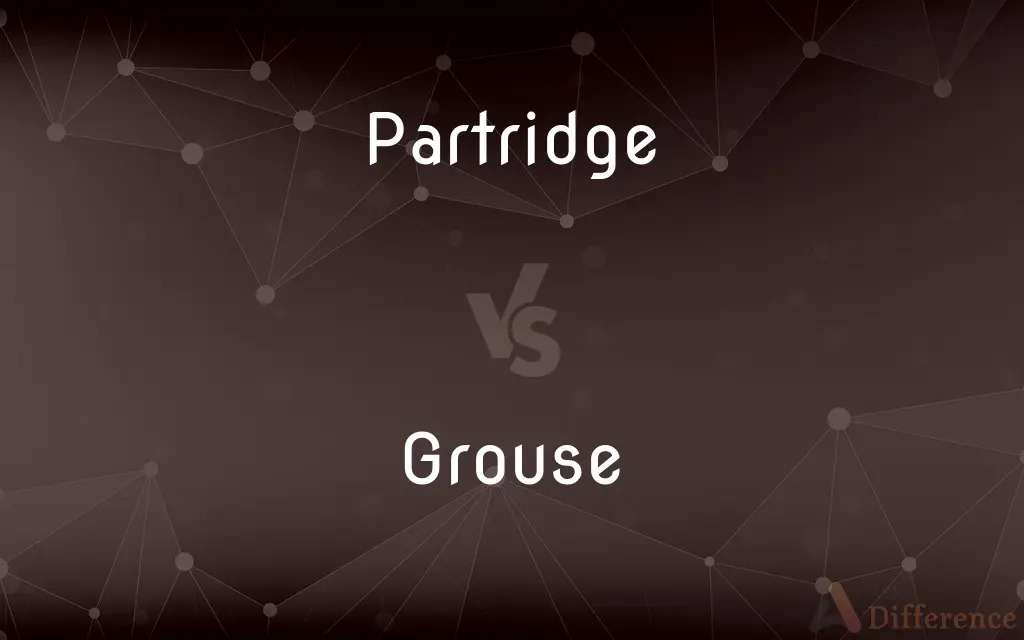Partridge vs. Grouse — What's the Difference?
By Tayyaba Rehman — Updated on July 6, 2024
The partridge is a non-migratory, Old World bird that typically dwells on the ground. Grouse are ground-dwelling birds as well, but they encompass a wider family that includes species found in forests and tundras.

Difference Between Partridge and Grouse
Table of Contents
ADVERTISEMENT
Key Differences
Partridges are part of the pheasant family, with a preference for warmer climates and often found in Europe, Asia, and Africa. Grouse are adapted to cooler environments, including the forests and tundra of the Northern Hemisphere.
While both partridges and grouse are game birds with a plump body and short legs, partridges often have a more varied diet, including seeds and insects. Grouse, on the other hand, are noted for their diet that can heavily consist of heather and other shrubs, especially in tundra regions.
The partridge is known for its ground-nesting habits and is often seen in open habitats like fields and grasslands. Grouse species have diverse habitats; some, like the forest grouse, dwell in dense woodlands, while others inhabit open spaces like the ptarmigans of tundra regions.
Social behaviors also distinguish partridges, which can be found in pairs or small family groups, from some grouse, which may display lekking behavior, where males gather to compete for females with elaborate displays.
Lastly, cultural significance differs; the partridge is famously mentioned in the Christmas song "The Twelve Days of Christmas," while various grouse species play roles in the ecology and hunting traditions of their native regions.
ADVERTISEMENT
Comparison Chart
Habitat Preference
Prefer warmer climates, often found in open fields
Adapted to cooler environments, including forests
Diet
Varied, including seeds and insects
Often consists of heather and other shrubs
Social Behavior
Found in pairs or small groups
Some species display lekking behavior
Nesting
Typically ground-nesting
Habitat varies; some also ground-nest
Cultural Significance
Featured in European culture and songs
Important in ecology and hunting traditions
Compare with Definitions
Partridge
A bird of the pheasant family, typically with a brown plumage.
A partridge scurried through the underbrush.
Grouse
Birds adapted to a variety of environments, including tundra.
Tundra grouse are well camouflaged against the Arctic landscape.
Partridge
A game bird that is often hunted for sport.
He went hunting for partridge in the countryside.
Grouse
Some species, like the sage-grouse, are of conservation concern.
Conservationists are working to protect the sage-grouse's habitat.
Partridge
Featured in the song "The Twelve Days of Christmas."
On the first day of Christmas, my true love sent to me a partridge in a pear tree.
Grouse
Many species are known for elaborate courtship displays.
During spring, the male grouse's display attracts females from all around.
Partridge
They are medium-sized birds and often dwell on the ground.
The partridge pecked at seeds along the footpath.
Grouse
A family of birds known for their feathered legs and feet.
The grouse trudged through the snow with its feathered feet.
Partridge
Any of several game birds, such as the ruffed grouse or the bobwhite, similar to a partridge.
Grouse
Grouse are a group of birds from the order Galliformes, in the family Phasianidae. Grouse are frequently assigned to the subfamily Tetraoninae or tribe Tetraonini (formerly the family Tetraonidae), a classification supported by mitochondrial DNA sequence studies, and applied by the American Ornithologists' Union, ITIS, and others.
Partridge
The species of partridge is any member of a paraphyletic group of organisms that consist of all medium-sized non-migratory birds, with a wide native distribution throughout Europe, Asia, and parts of Africa. They are sometimes grouped in the Perdicinae subfamily of the Phasianidae (pheasants, quail, etc.).
Grouse
Any of various plump, chiefly ground-dwelling gallinaceous birds of the subfamily Tetraoninae of northern North America and Eurasia, characteristically having feathered legs and nostrils and mottled plumage.
Partridge
Any of various plump-bodied game birds of several genera in the family Phasianidae, native to Eurasia and Africa and introduced elsewhere.
Grouse
A cause for complaint.
Partridge
(ornithology) Any bird of a number of genera in the family Phasianidae, notably in the genera Perdix and Alectoris.
On the first day of Christmas, my true love sent to me a partridge in a pear tree.
Grouse
To complain; grumble.
Partridge
A type of cannon charge composed of several missiles fired all together, similar to langrage or case-shot. Also a large cannon that shoots stones.
Grouse
(countable) Any of various game birds of the subfamily Tetraoninae which inhabit temperate and subarctic regions of the Northern Hemisphere; specifically, the red grouse (Lagopus lagopus scotica) native to heather moorland on the British Isles.
Partridge
Any one of numerous species of small gallinaceous birds of the genus Perdix and several related genera of the family Perdicidæ, of the Old World. The partridge is noted as a game bird.
Full many a fat partrich had he in mew.
Grouse
(uncountable) The flesh or meat of this bird eaten as food.
Partridge
Any one of several species of quail-like birds belonging to Colinus, and allied genera.
Grouse
(informal) A cause for complaint; a grumble.
Partridge
The ruffed grouse (Bonasa umbellus).
Grouse
(intransitive) To hunt or shoot grouse.
Partridge
Flesh of either quail or grouse
Grouse
To complain or grumble.
Partridge
Heavy-bodied small-winged South American game bird resembling a gallinaceous bird but related to the ratite birds
Grouse
Excellent.
I had a grouse day.
That food was grouse.
Partridge
Small Old World gallinaceous game birds
Grouse
Any of the numerous species of gallinaceous birds of the family Tetraonidæ, and subfamily Tetraoninæ, inhabiting Europe, Asia, and North America. They have plump bodies, strong, well-feathered legs, and usually mottled plumage. The group includes the ptarmigans (Lagopus), having feathered feet.
Partridge
A popular North American game bird; named for its call
Grouse
To seek or shoot grouse.
Partridge
Valued as a game bird in eastern United States and Canada
Grouse
To complain or grumble; as, employees grousing about their incompetent boss.
Partridge
Known for ground-nesting habits and inability to migrate.
Farmers often found partridge nests at the edge of their fields.
Grouse
Flesh of any of various grouse of the family Tetraonidae; usually roasted; flesh too dry to broil
Grouse
Popular game bird having a plump body and feathered legs and feet
Grouse
Hunt grouse
Grouse
Complain;
What was he hollering about?
Grouse
Typically larger than quails and partridges.
The grouse's size makes it a prized game bird.
Common Curiosities
Do partridges migrate?
Most partridge species are non-migratory.
Is a partridge the same as a grouse?
No, they are different species, although both are ground-dwelling birds.
Can partridges fly?
Yes, partridges can fly but prefer running to escape predators.
Are grouse found worldwide?
Grouse are primarily found in the Northern Hemisphere.
Is grouse hunting popular?
Yes, grouse hunting is a traditional sport in many regions.
Are partridges solitary birds?
They can be solitary or found in pairs/small groups.
Are grouse endangered?
Some grouse species are considered at risk or endangered.
What's a notable feature of grouse?
Grouse often have elaborate mating dances and displays.
Do partridges have a role in culture?
Yes, partridges are featured in various cultural references, like songs and stories.
Do all grouse have feathered legs?
Many grouse species have feathered legs, which help them in cold habitats.
What do partridges eat?
Partridges typically eat seeds, insects, and small invertebrates.
Can partridges be kept as pets?
While not typical, some people may keep them as part of aviaries.
Why is grouse conservation important?
Grouse play a significant role in their ecosystems and cultural traditions.
What is a lek as it relates to grouse?
A lek is a gathering of males that compete for mates through displays.
Where do partridges build their nests?
Partridges usually nest on the ground, hidden among vegetation.
Share Your Discovery

Previous Comparison
Chairperson vs. Chair
Next Comparison
Target vs. GoalAuthor Spotlight
Written by
Tayyaba RehmanTayyaba Rehman is a distinguished writer, currently serving as a primary contributor to askdifference.com. As a researcher in semantics and etymology, Tayyaba's passion for the complexity of languages and their distinctions has found a perfect home on the platform. Tayyaba delves into the intricacies of language, distinguishing between commonly confused words and phrases, thereby providing clarity for readers worldwide.












































